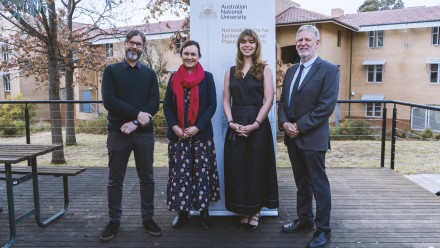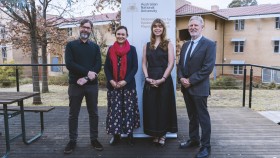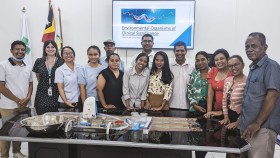March report for Epidemiology for Policy and Practice
Share
New grants/funding
- Ray Lovett’s team received the Gandel Philanthropy Grant - $300k to fund two community researchers (in Tas and Vic) for the Mayi Kuwayu Study.
Media
- Emily Banks presented the 7th International Agency for Research on Cancer and Society Lecture: https://www.iarc.fr/video/7th-iarc-cancer-and-society-lecture/
Implementation, Engagement and Outreach
- Grace Joshy and Rosemary Korda attended the Health Data Analytics Collaboration (HARC) Forum on Accessing Data on 17th Feb at the Health Directorate focussed on accessing ACT data. With close to 70 participants, there were presentations focussed on ACT data and discussions on consent, academics adding value to data quality, data record linkage and data management, training requirements around data release.
- Grace Joshy will start supervising another “workplace” student project in Sem1-2020 for the Biostatistics Collaboration of Australia. The student is doing the Biostatistics Collaboration of Australia Masters in Biostatistics program through University of Sydney, but is based in Canberra and works full-time at the Australian Institute of Health and Welfare. (The BCA Master’s program is 3 years part-time delivered via online modules, and most students are already in workplaces. NCEPH internal review in 2018 identified supervision of BCA student projects as a good option to become involved).
- Tues 25 Feb Thiitu Tharrmay Reference Group - Jason Agostino and Andrea Timothy presented to the Thiitu Tharrmay reference group on the consensus statement and the CVD risk communication toolkit. We sought feedback re key messages for health professionals and the general public for the consensus statement, and general feedback on appropriateness of language used, artwork and design of toolkit. The items were positively received and we collected helpful feedback for improvements.
- CVD software roundtable on 26 March: Jason Agostino, Deb Wong and Andrea Timothy will be hosting a roundtable on software for CVD risk assessment and surveillance at end of March, aiming to facilitate update of the online CVD risk calculators and improve audit software (currently the calculators, that also form the basis of medical software packages, miss a large number of people at high risk due to conditions such as diabetes and renal disease and do not allow risk assessment in < 35 year olds). In conjunction with Assoc Professor Kim Greaves who will be presenting findings of Vanguard Project and seeking feedback from stakeholders in government and software industries.
- Jason Agostino attended a CSIRO Primary Care Data Quality Workshop attended by government, research and software stakeholders about improvements to medical software packages that will enable better use of data in primary care. The productive discussion and networking has resulted in establishment of solutions to updating CVD risk calculators and a follow up meeting is planned for April 2020.
- On the 17th Feb Jason Agostino attended the NACCHO Core Services and Outcomes Framework Steering Committee: Jason participated in this steering committee which oversees a project to define the core elements of health care provided in Aboriginal Community Controlled Health Organisations.
Papers accepted/published
- Consensus statement [under embargo until online release 16th March in MJA]: Cardiovascular disease risk assessment for Aboriginal and Torres Strait Islander adults aged under 35 years: a consensus statement from RACGP, NACCHO, Heart Foundation and CARPA. The consensus statement aligns recommendations on the age to commence Aboriginal and Torres Strait Islander CVD risk assessment across three guidelines produced by: the National Vascular Disease Prevention Alliance (now Australian Chronic Disease Prevention Alliance), National Aboriginal Community Controlled Health Organisation and Royal Australian College of General Practitioners and Central Australian Rural Practitioners Association. It is based upon the latest evidence, and is the result of engaging guideline developers, representatives from the Aboriginal Community Controlled Health sector, leading Aboriginal researchers in CVD and consultation with the ANU’s Aboriginal Reference Group for CVD Health (now expanded to the Thiitu Tharrmay Reference Group). The consensus statement will be published in the Medical Journal of Australia on 16th March 2020 (online) and 18th May 2020 (paper). Key messages from the consensus statement drafted for the general public include:
- Most heart attacks and strokes can be prevented and in the last 20 years the rate of deaths from heart attacks and strokes among Aboriginal and Torres Strait Islanders peoples has almost halved.
- Four out of five young Aboriginal and Torres Strait Islander adults have a risk factor for cardiovascular disease. This is why screening for risk factors for heart attacks and strokes from the age of 18 is recommended. A heart health check includes things like assessing smoking, blood pressure, cholesterol and checking for diabetes and kidney disease
- What you can do: Get a health check – the earlier things are picked up, the earlier we can take action to strengthen health and help you to live a healthier, longer life.
Dissemination of the key messages will be through various health professional and community organisations. Our team is working with RSPH Marketing & Communications who are coordinating with media at Heart Foundation, RACGP and NACCHO and possibly DoH.
- Welsh J, Korda RJ, Banks E, Strazdins L, Joshy G, Butterworth P. Identifying long-term psychological distress from single measures: Evidence from a nationally representative longitudinal survey of the Australian population. BMC Medical Research Methodology. (Accepted 22 Feb 2020).
- Snijder, M., Calabria, B., Dobbins, T., Shakeshaft, A. (2020). "Factors associated with alcohol-related injuries for Aboriginal and non-Aboriginal Australians: an observational study." International Journal of Environmental Research and Public Health 17: 387.
Progress on research projects.
-
Jason Agostino, Deb Wong and Andrea Timothy are working on deliverables due to the DoH at end of March: Two reports (educational materials and updating the CVD risk calculators), a quarterly progress report, and a CVD risk communication toolkit.










